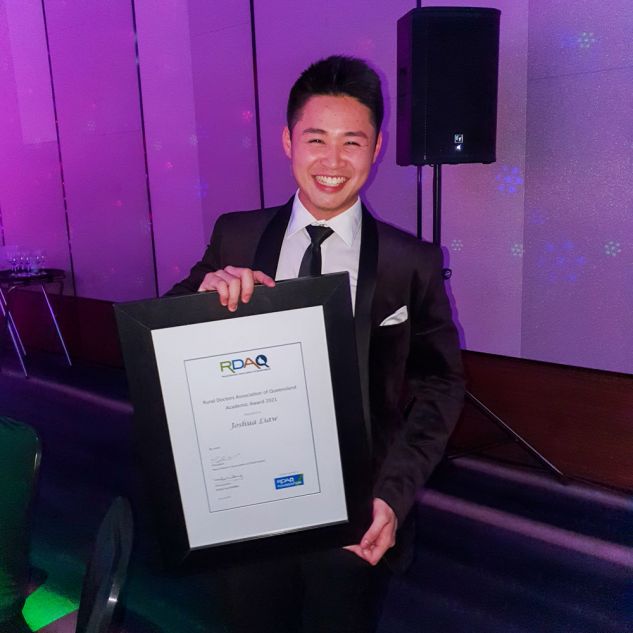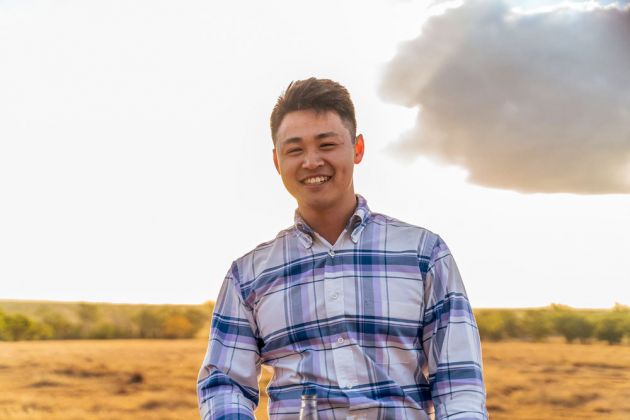A love for community, and a place to call home
Honours student Joshua Liaw can look back on many inspiring life lessons during six years of medicine at James Cook University. The lessons from family, though, are front of mind as he prepares to graduate next week.
Josh was born in Gladstone and grew up in the small nearby town of Tannum Sands. “Growing up in a predominantly Caucasian town as a second-generation migrant had its challenges,” he says. “It is a discomfort I have learnt to embrace, as it has opened up to me the best of both worlds in North Queensland: a love for community, and a place to call home.
“Being the youngest of three boys meant I could always look up to my older brothers. They took on the hardest challenges head-on and paved a smoother path for me to follow.”


Josh says his mother inspired his medical career and more: “Mum has been a nurse at Gladstone Hospital since we were born. She purposely took up night shifts just so she could make our lunchboxes in the morning, drop us off and pick us up from school, help us with homework in the afternoons – all with a few hours of sleep while we were at class,” he says.
“My dad would come home to take over night duties as the cycle repeated. We often don’t appreciate the sacrifices of our loved ones until we’re older. But as I look back, this career is one unintentionally inspired by my family, who showed me the value of caring for and helping others, and who provided me the opportunity to pursue a career in medicine.”
Josh won the prestigious Rural Doctors Association of Queensland Academic Award this year for his Honours research on the prevention of Rheumatic Heart Disease (RHD), a disease that predominantly affects young Aboriginal and Torres Strait Islander peoples and has a high burden in North Queensland.
We asked him to tell us some of the highlights of his time at JCU and share some of what he’s learned along the way.
More than a degree
Studying at JCU has been so much more than a degree. With a focus on rural and Aboriginal and Torres Strait Islander health, the course surpasses its goal in inspiring a passion for bridging health inequity and rural and remote health. Some of the highlights of the degree have been my rural placements, from Proserpine and Bowen, all the way north to Innisfail: sailing with the Risky Business crew around Bowen islands, spearfishing up north, delivering outreach services in remote community health, and the experiences and stories that come from immersing in small-town living.


Embracing serendipity
My final two years of medical school were spent in Mackay – I would say it was the best non-choice I ever made. The move at the end of Year 4 was a disruptor to all perceptions of being comfortable. Yet it opened up far-reaching clinical and research experiences, the Whitsundays, serene beaches, and an array of new and exciting people. If I could give any advice, it is to embrace serendipity. Often when we take advantage of things that don’t go our way, they surprise us in ways we never expected.
During my degree, I was also fortunate to work with many inspiring clinicians and researchers on projects that aimed to improve service delivery for Aboriginal and Torres Strait Islander children living with Rheumatic Heart Disease in North Queensland. This work took me across Queensland from Cairns to the Gold Coast, with opportunities to share our research in hopes of translating this to improved clinical care. It has been not just a highlight experience, but an invaluable learning period. The push to take on new challenges is exciting – and seldom not worth overdoing.



Medicine as a lifestyle
Health care is so much more than what happens in the hospital. It is a cumulation of all aspects of our way of life, our culture, our identity. Valuable lessons that help us deliver care often come from experiences out of medicine.
Some of my favourite pastimes are getting outdoors in North Queensland. Diving out at the Great Barrier Reef and kitesurfing have taught me to stay in the moment and learn to respond to problems instead of reacting. Medicine can be fast paced, but often I come back to this quote by ex-professional spearfishing champion Kimi Werner: “When you feel the need to speed up, slow down.”
Work-life balance is a skill I am admittedly far from obtaining, but it’s something I want to actively pursue as I begin a full-time job. I’m keen to be involved in my sports and pick up new hobbies along the way.


What's next?
I’m not done with North Queensland just yet – I’m heading back up to Townsville for internship. Where my future will lead to is a resounding TBA. I hope to pursue my interests in rural health and paediatric medicine. Until then, improving my clinical and research skills, and my fishing game will be priorities in the year coming.


Final words of advice
It’s an exciting time for those thinking about, or starting a degree in health care in 2022. Look after each other, embrace serendipity, and most importantly enjoy all that North Queensland has to offer.
Take a deep breath – a career in health care is a long and rewarding journey. Where am I? I have but reached the end of the beginning. I’m very excited for the next chapter after graduation and hope to make the most of the challenges to come.
Want to know more about the unique experiences available through JCU’s placement opportunities? Read about Cairns-based Kane Langdon's time as a student doctor in the outback town of Blackall.